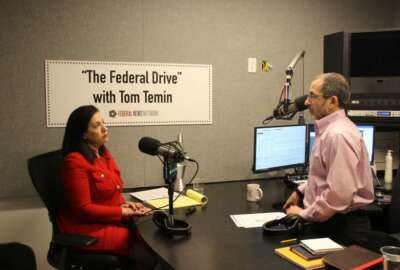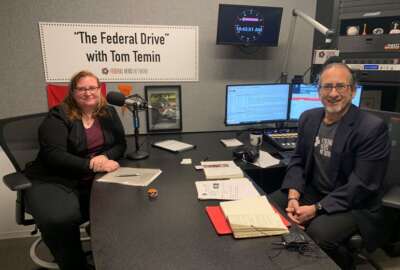How the Federal Energy Regulatory Commission is shifting its enforcement strategy
Attorney Levi McAllister says FERC is focusing more on energy market trading, and on entities meeting those conditions.
Best listening experience is on Chrome, Firefox or Safari. Subscribe to Federal Drive’s daily audio interviews on Apple Podcasts or PodcastOne.
You might have noticed energy, the climate and infrastructure have become leading topics for the federal government. Levi McAllister said that’s beginning to manifest itself in sort of a bellwether agency, the Federal Energy Regulatory Commission (FERC). For more on what’s going on, the energy specialist and partner at the law firm Morgan, Lewis & Bockius LLP spoke to the Federal Drive with Tom Temin.
Interview transcript:
Tom Temin: Mr. McAllister, good to have you on.
Levi McAllister: Hey, good to be on. Thank you for having me, Tom.
Tom Temin: And just review briefly for us the area of energy that FERC actually oversees. My understanding, it’s mainly the long haul interstate transmission of energy. Is that correct or is it more or less than that?
Levi McAllister: That’s exactly right. So FERC, the Federal Energy Regulatory Commission, it’s the federal regulator of the energy industry. Of course, all sectors of the energy industry are also regulated by the states. And so the question as you pose it, is, where [does] the FERC jurisdiction start and stop? FERC regulates the electricity sector, as well as the natural gas sector and the hydro sector. So for both electricity and natural gas, the FERC’s authority is what they call wholesale sales of energy, or interstate transmission or transportation. So to put that into a context that the average person understands, meaning the person who’s not practicing before FERC, if you have a transmission line that transmits electrons across state lines, FERC is going to regulate that. If you have a sale of energy that’s being sold for subsequent resale, FERC regulates that as well. And it’s the same concept within the natural gas sector as well as the molecules of natural gas. So very broad jurisdiction, and also very long-standing regulatory authority dating back to the Federal Power Commission or in the late ’70s and even before that.
Tom Temin: All right, so you have written that you have observed a shift in their regulatory and enforcement actions, to policing infrastructure development and ensuring compliance with authorizations granted in certificate orders, what does that mean? And how is it different from what they have traditionally done?
Levi McAllister: So let me sort of provide a context for the listeners, as far as FERC’s, what we call their enforcement authority. A lot of folks may remember the California energy crisis dating back to around June of 2000, and what happened with Enron and those type of activities. Now at that point in time, FERC as an agency had very limited oversight authority to issue civil penalties for wrongdoing in the energy market. It’s just something by federal statute that was really sort of lacking. So that happens in 2000, 2001, a couple years later Congress passes the Energy Policy Act of 2005, which among other things provided FERC a very clear statutory mandate and obligation to investigate and penalize instances of misconduct in the energy markets that are subject to their jurisdiction. So interstate transmission of electricity, natural gas and wholesale sales. FERC’s penalty authority is significant. Under the statute, they have a penalty authority of a little bit more than $1 million per violation per day.
And so when you think about the carrot and the stick approach, FERC has a very big stick as far as their enforcement authority is concerned. So dating back to 2005, 2006 when they received this authority and really started to implement it, initially, Burke’s focus was what I like to call commodity trading, or energy markets. So the actual purchase and sale of electricity or natural gas and FERC was really focused on a manipulation of the markets, fraudulent activity in any number of sort of factual circumstances or schemes as alleged by FERC. And those types of investigations really produced significant penalties for market participants separate and apart from that, particularly in the natural gas sector when FERC authorizes the development of a natural gas pipeline, they issue what is called a Certificate of Public convenience and necessity. And that certificate issued by FERC says, Okay, you can construct this asset that you’re looking to construct, but you have to meet all of these various conditions during the course of development and operation. Tying those two concepts together, what we have seen more recently, really, in the last two years or so, FERC enforcement continued focus on energy market trading, in other words, potential manipulative activity or fraudulent trading, but also a focus on our entities meeting those conditions. Are they violating those conditions for assets that have been constructed and in operation for many, many years, are they now starting to violate conditions that were imposed years ago? FERC is focusing on that, especially as it relates to environmental conditions, which is an area that as I mentioned, as you teed up, they didn’t really focus on at all in their enforcement oversight until more recently.
Tom Temin: We’re speaking with Levi McAllister, he’s a partner at the law firm Morgan, Lewis & Bockius. And what could be their motivation? I mean, could it be that they’re simply trying to get rid of pipelines in an indirect way, because the administration has said it wants to end the oil and gas industry?
Levi McAllister: I don’t know that it would be that extreme of a motivation. I do think that there are two things at play here. The first is when the FERC Office of Enforcement was initially created, following the passage of the Energy Policy Act, it was a smaller office, smaller in terms of number of people that staffed it, the type of budget that the office had with which to operate. And it has grown over time, and it’s now a very significant and very large office. And so I think this shift in focus or this addition and focus to the office of enforcement is the first reaction is it’s a product of it just been a larger office, a deeper skill set, more expertise, okay?
But second, and more importantly, it does reflect, I believe, a change in the administration, both with the Biden administration, and as it sort of flows downward the composition of FERC itself, and in particular, Chairman [Rich] Glick being installed as the chairman at FERC. Chairman Glick has been very vocal and open about his intention to consider environmental impacts of infrastructure development, consider social justice or environmental justice-related issues in the course of what FERC is reviewing as it relates to asset infrastructure. And so the flip side of that is in the enforcement space, I do think that there’s, I don’t want to say an explicit mandate by any means but there is sort of a policy from the top down being the chairman’s office down to focus on compliance with environmental conditions.
Tom Temin: And as an attorney, and someone who advises, I presume, companies that are in this business, and that’s one of the Washington’s thriving sub-legal categories is energy regulation, is Chairman Glick do you believe within his mandate legally? Or are some of these enforcement actions going to get to the Supreme Court, which will say, “Well, no, Congress didn’t mean for you to regulate environmental justice of wires and pipes?”
Levi McAllister: That’s actually a really interesting question. And I want to be careful, because I don’t want to speculate too far as to what may or may not be within the legal authority just because of obviously, I want to be mindful of where I may be involved in the future as this evolves. But what I will say is that FERC’s authority and the Office of Enforcement authority is extremely broad. And there is a tendency to bestow a tremendous amount of discretion from the courts to the agency in how they interpret their authority. And there’s well settled law on that point. What I will also say is that there are some pending cases before various courts of appeals that deal with the idea of where FERC’s authority starts and stops, not in the environmental compliance space, not in the environmental justice space, but sort of in a different tack that’s still concerning where their jurisdiction starts and stops. How those cases are decided could become irrelevant if and when some of the existing enforcement matters ultimately make their way through the courts.
What I will say, just one caveat, and I’m gonna get really down into the weeds here. But FERC’s enforcement authority, I’ve mentioned the Energy Policy Act, but it flows into the Federal Power Act for the electricity sector, and the Natural Gas Act for the gas sector. A market participant’s access to the courts for relief differs, depending on whether they’re in the electricity sector, and therefore subject of the Federal Power Act, or in the natural gas sector and therefore subject to the Natural Gas Act. So market participants still do have access to the courts. But it’s a little bit of a longer road that they have to travel in the gas sector than the power sector. So I raised that only because as we think about cases, current FERC investigations that may make their way into the courts. It’s a longer lead time when we’re talking about gas investigations and gas assets.
Tom Temin: Sure. And a final question pursuant to some of this expanded regulatory activity that you’ve seen. Is there any rulemaking pursuant to that, that you’ve seen FERC undertake?
Levi McAllister: Not in the enforcement space. But when we go back to the chairman’s office and this idea of emphasizing environmental justice and looking at environmental impacts as it relates to the energy industry overall, there are some policy statements that the commission has recently issued in the context of certification of natural gas assets. Those policy statements, they’re not actual rulemakings promulgated under the Administrative Procedure Act, but they are, do reflect the policy of the commission. They were issued maybe about a month or two ago, and were recently put on hold because of some of the opposition that made itself apparent following the public release of those policy statements. So to directly address your question in the enforcement space, we’re not seeing those rulemakings. But the broader commission we’re seeing, those efforts through policy statements and they are very contentious, and it’s unclear at this time. Even though the chairman may want it to go one direction, that’s not necessarily the way that the commission itself is gonna go.
Tom Temin: Levi McAllister is a partner at the law firm Morgan, Lewis & Bockius. Thanks so much for joining me.
Levi McAllister: Thank you. I appreciate it.
Copyright © 2025 Federal News Network. All rights reserved. This website is not intended for users located within the European Economic Area.
Tom Temin is host of the Federal Drive and has been providing insight on federal technology and management issues for more than 30 years.
Follow @tteminWFED






